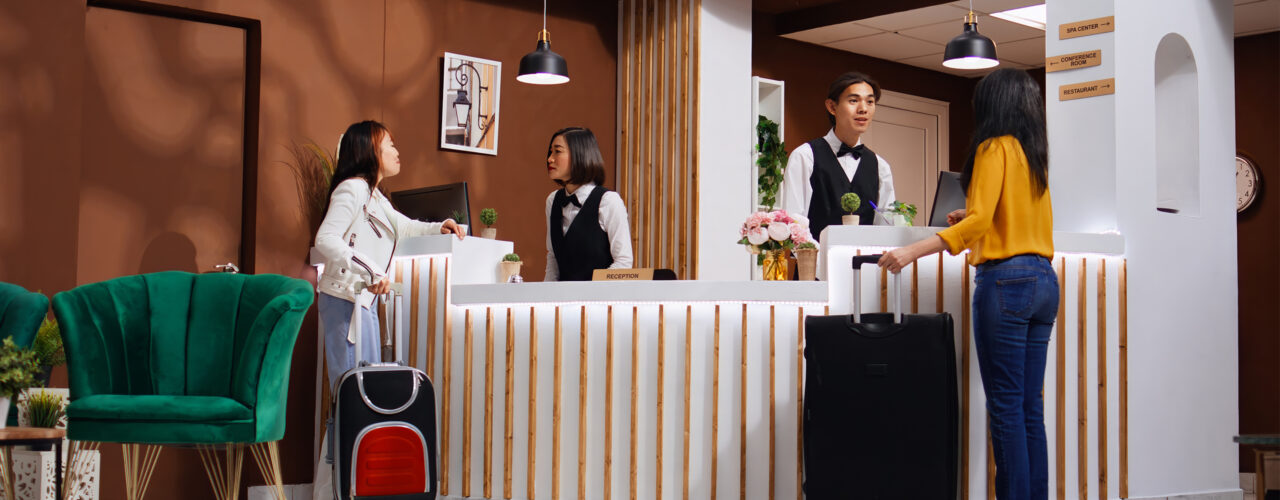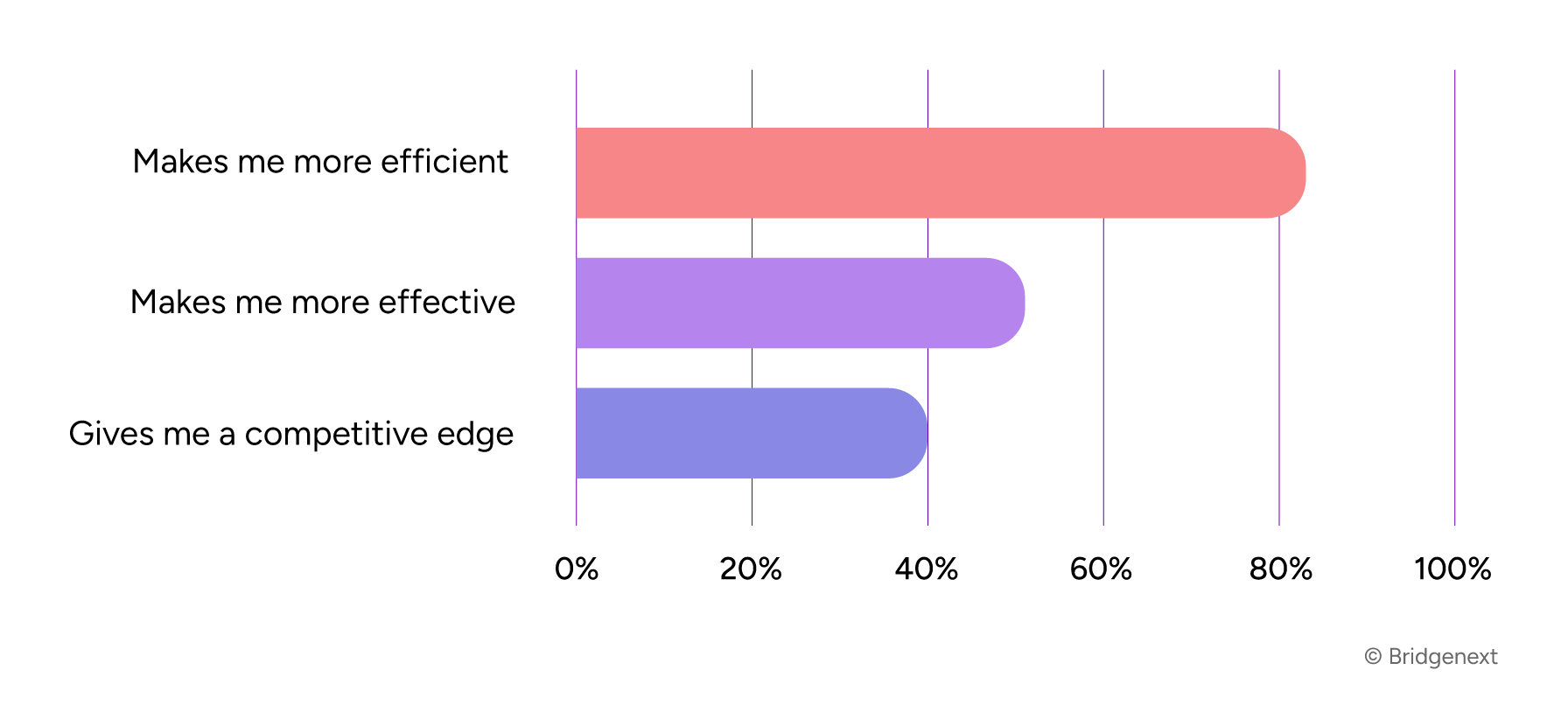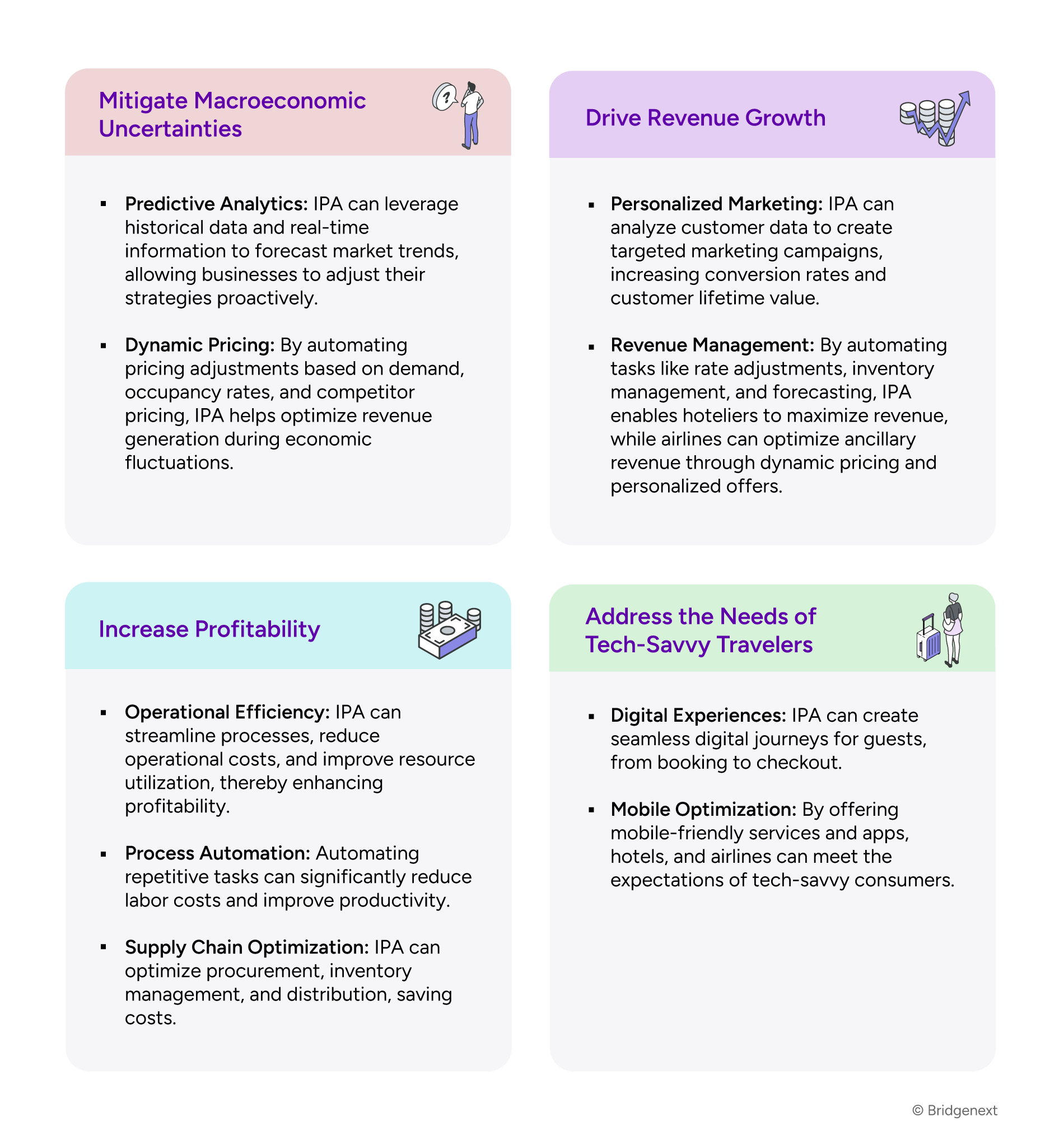08.13.24 By Bridgenext Think Tank

The travel and hospitality industry is undergoing a major transformation, driven by the rising expectations of tech-savvy travelers who demand exceptional experiences and seamless journeys. The industry is increasingly turning to automation to meet these evolving demands while optimizing operations and costs.
Intelligent Process Automation (IPA) is at the forefront of this transformation. Unlike traditional automation, IPA integrates robotic process automation (RPA), process mining, intelligent document processing, analytics, and AI to create a powerful technology suite capable of thinking, learning, and adapting. This advanced capability empowers travel and hospitality-focused businesses to handle complex tasks that mimic human intelligence, driving significant efficiency and improvements in customer satisfaction.
80% of hoteliers say automation is making them more efficient.
– Hotel Operations

Intelligent Process Automation (IPA) has evolved significantly, particularly with integrating large language models (LLMs). This advancement transforms IPA from a task-oriented tool to a strategic partner capable of sophisticated problem-solving. LLMs endow automation with a deeper understanding of language and context, enabling more nuanced and personalized interactions.
By automating routine tasks, IPA frees human resources to focus on higher-value activities demanding creativity and empathy. Contrary to the myth of technology replacing human connection, IPA empowers staff to deliver exceptional guest experiences. For instance, employees can dedicate time to crafting personalized interactions or developing innovative services instead of manual data entry.
Given the increasing complexity of operations and the demand for personalized experiences, IPA can provide numerous benefits for firms in the travel and hospitality industry. Let us explore specific applications and use cases of IPA to demonstrate its transformative potential.
The travel and hospitality industry operates within a complex and dynamic environment characterized by intense competition, rising customer expectations, and high operational costs. Let’s dive into the challenges that intelligent process automation can address:
Travel and hospitality businesses must prioritize efficiency, customer satisfaction, and profitability to remain competitive. AI-driven automation is a strategic imperative that can address these challenges.
Apart from the concerns above, there are additional strategic initiatives where IPA can lend a helping hand:

By strategically implementing IPA, travel and hospitality businesses can increase their competitive advantage for long-term success.
| Facets | Hotels & Resorts | Airlines | Cruises | IPA Optimization | Solutions | Value for Users |
|---|---|---|---|---|---|---|
| Core Operations | Booking, housekeeping, F&B | Flight scheduling, ticketing, baggage handling | Itinerary planning, cabin allocation, onboard services | Automate tasks, optimize schedules, improve passenger experience | AI-powered scheduling, chatbot assistants, baggage tracking systems | Increased efficiency, reduced costs, enhanced customer satisfaction |
| Guest Experience | Guest relations, amenities | In-flight service, loyalty programs | Guest relations, onboard entertainment | Personalize experiences, predict customer needs, resolve issues promptly | Customer sentiment analysis, recommendation engines, virtual assistants | Improved customer loyalty, increased revenue, enhanced brand reputation |
| Revenue Management | Room rates, occupancy | Ticket pricing, ancillary revenue | Cruise fare, onboard spending | Optimize pricing, predict demand, identify revenue opportunities | Dynamic pricing models, revenue management systems, customer segmentation | Increased revenue, improved profitability, optimized resource allocation |
| Technology | Property Management System (PMS), Customer Relationship Management (CRM), and Point of Sale (POS) | GDS, passenger information systems, flight operations systems | Passenger information systems, reservation systems, shipboard management systems | Integrate systems, automate data exchange, enhance cybersecurity | Cloud-based platforms, API integration, data encryption | Improved operational efficiency, enhanced data security, better decision-making |
Intelligent Process Automation (IPA) has transcended its origins as a simple automation tool to become a strategic catalyst for transformation in the travel and hospitality industry. And, IPA is rapidly evolving, driven by advancements in technology and the growing demand for intelligent solutions. Key trends shaping the future of IPA in travel and hospitality include:
IPA is revolutionizing the way travel and hospitality businesses operate. Here are some of the best use cases:
London-based Edwardian Hotels successfully implemented a fully self-service guest experience through their chatbot. This innovative approach streamlined operations and significantly boosted revenue, increasing room service sales by up to 50%. Chatbot’s ability to efficiently handle guest requests and provide information demonstrated the potential of AI-driven solutions to enhance guest satisfaction and drive business growth.
Online travel giant Kayak revolutionized the travel planning experience with its AI-powered virtual travel assistant. By leveraging natural language processing, the assistant provides real-time flight, hotel, and rental car options tailored to individual preferences. The chatbot’s ability to understand complex queries and offer personalized recommendations has significantly increased user engagement and booking conversions. This innovative approach demonstrates the power of AI in transforming the travel industry and delivering exceptional customer experiences.
Leading hotel chains like Hilton and Hyatt are utilizing IPA for predictive maintenance of their facilities. By analyzing equipment performance data, these chains can identify potential equipment failures before they occur, minimizing downtime and reducing maintenance costs. This proactive approach improves operational efficiency and enhances guest experience.
OTA giants like Expedia and Booking.com leverage IPA to provide highly personalized travel recommendations to their customers. These platforms offer tailored suggestions for flights, hotels, and activities by analyzing user behavior, preferences, and historical data. This personalized approach enhances user experience and drives higher conversion rates.
Intelligent Process Automation (IPA) presents a compelling opportunity for travel and hospitality organizations to optimize operations, enhance customer satisfaction, and drive revenue growth. From streamlining operations to enhancing guest experiences, the possibilities are vast.
A successful IPA journey may require a strong partner who understands the unique challenges and opportunities within the travel and hospitality sector.
And Bridgenext offers comprehensive IPA solutions tailored to the specific needs of travel and hospitality businesses. With our deep industry knowledge and proven track record, we can help you navigate the complexities of an IPA implementation. Contact us to learn more about the competitive advantage that intelligent process automation (IPA) can provide.
Looking for a way to get started with IPA?
Implement this checklist today to take the first step toward transforming your business. Get Started Now!